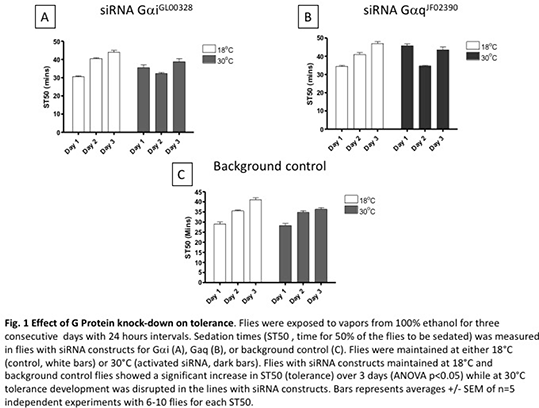| 221P London, UK Pharmacology 2016 |
Knock-down of G proteins alters alcohol induced behaviour in Drosophila melanogaster
Introduction
Alcohol Use Disorder (AUD) is characterized by excessive alcohol consumption pursued despite knowledge of its negative health effects1. The mechanisms of alcohol-induced behavioural changes are not fully understood. We have shown that repeated ethanol exposures reduces G proteins mRNA levels and causes tolerance measured as an increase in the flies’ sedation time2. In this work we have measured the response to ethanol in flies where the expression of G proteins was constitutively down regulated.
Methods
Flies expressing siRNA for Gi or Gq were bred with flies expressing Gal in a temperature controlled manner via the Gal80TS system. The sedation time (ST50) was measured by exposing Drosophila to alcohol vapor in small chambers at 24°C (6-10 males-1-3day old, triplicate chambers). The ST50 was determined as the time when half of the flies were not able to move or showed rapid wing movement. The ST50 was measured in flies maintained at 18°C (not expressing siRNA) or exposed to 30°C (expressing siRNA) for 24 hours. Flyes were sourced from Bloomington stock center: UAS-siRNAGq (BL36775), UAS-siRNAGi(BL35407), TRiP Control (BL36303). Gal4 driver line was a gift from UCL Ear Institute
Results The crossing resulted in flies expressing siRNA in a temperature dependent manner. The ST50 in the offspring flies maintained at 18°C increased over three days, as expected. Conversely, when the flies were maintained at 30°C they showed a higher sensitivity to alcohol on the first day of exposure and no further significant increase of ST50 occurred (figure1). Overall, alteration of Gαq and Gαi expression via siRNA reveals disruption of tolerance pattern. (ANOVA: p<0.01 at 18°C , p>0.05 at 30°C). an alteration that was not seen in the mutant backgrounds, indicating that the tolerance process was disrupted when G proteins were knocked down.
DiscussionThe observation that ethanol exposure causes the development of tolerance and a reduction of certain G protein gene expression and conversely knock-down of the same G proteins disrupts the development of tolerance, indicates that G protein expression has a role in the development of tolerance. Future investigations on the chronology of ethanol induced G protein gene expression and its cellular localization will further elucidate the mechanism of tolerance.
References
1. Moonat, S., (2010) Cell Mol Life Sci, 67(1), 73-88.
2. Aleyakpo B et al. (2015)
http://www.pA2online.org/abstracts/Vol13Issue3abst307P.pdf.


